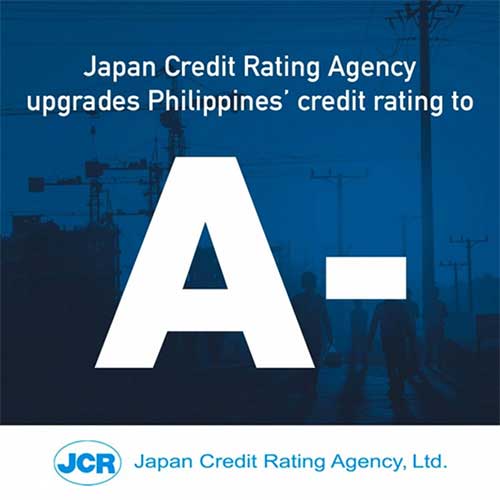
By Francis Allan L. Angelo
The Japan Credit Rating Agency, Ltd. (JCR), has reaffirmed the Philippines’ credit rating at an impressive “A-” with a stable outlook, recognizing the nation’s continuous economic vigor, robust domestic demand, and resilience to external adversities.
JCR commended the Philippines for maintaining a high and sustained economic growth rate, attributing it to strong domestic demand, a resilient stance against external shocks due to manageable external debt, and impressive foreign exchange reserves.
This financial fortitude contributes to the country’s formidable fiscal base, marking it as a credit strength.
A government debt-to-gross domestic product (GDP) ratio at approximately 60 percent by the end of 2023 positions the Philippines favorably, showcasing one of the lowest ratios among A-range rated sovereigns.
The Philippine Statistics Authority reported a remarkable 5.6 percent economic growth for 2023, outpacing other major Asian economies.
Looking forward, JCR expects the Philippine economy to bolster by around 6.0 percent in 2024.
This optimistic projection is driven by anticipated rebounds in external and tourism sectors, coupled with robust private consumption supported by moderate inflation and a stable influx of remittances from Filipinos overseas.
Governor Eli M. Remolona, Jr. of Bangko Sentral ng Pilipinas (BSP) expressed approval of JCR’s recognition.
“Our external payments position will continue to remain manageable, supported by sustained foreign exchange inflows from Overseas Filipino remittances, business process outsourcing revenues, foreign direct investments, and tourism receipts. In addition, the country maintained ample foreign exchange reserves,” he said in a press statement.
The BSP’s preliminary figures show a healthy gross international reserve of USD 103.3 billion as of end-January 2024, a significant buffer equivalent to 7.7 months of imports and service and primary income payments.
This maintained investment-grade rating is a harbinger of reduced credit risk, which potentially leads to lower borrowing costs for the country, thus enabling redirection of resources from debt payments to socially advantageous initiatives.


















